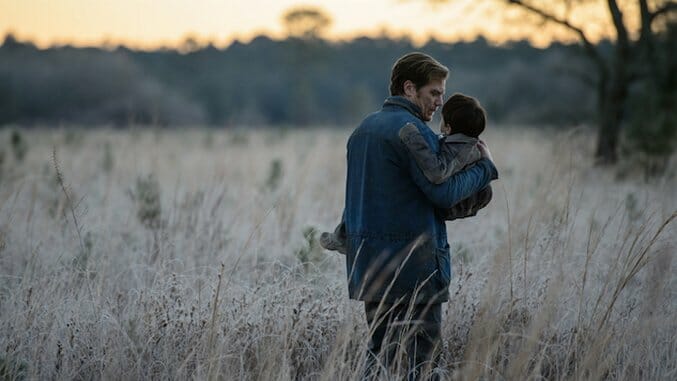Midnight Special

“Sometimes,” a character opines partway through Jeff Nichols’ new film, Midnight Special, “we’re asked to do things that are beyond us.” In the speaker’s case, those “things” entail activities including, but not limited to, stalking, interrogating and possibly murdering people. For the film’s audience, on the other hand, the only “thing” they must do is endure a Nichols movie, which in this case is a task easier said than done. Nichols is a fine filmmaker (Mud, Take Shelter) who has somehow been elevated to master status by his advocates. He doesn’t make bad movies, and he doesn’t make great movies. Instead, he makes movies that challenge, or outright mock, his viewers’ patience. They are Tough Mudder races made celluloid.
Midnight Special isn’t quite as bad as all that sounds, but it does demand one imbibe a couple mugs of coffee before watching. The film is a grind made hollow by a distinct lack of substance and a dearth of sentimental currency. Nichols shoots himself in the foot early on within the film’s opening minutes with a blatant evocation of Steven Spielberg’s E.T., a movie that either works or doesn’t for audiences based on the strength of its emotional resonance. That film gave us human beings, and other life forms, to care about. It also knew how to court our empathy, even if its methods for doing so were arguably of the cheap, cloying persuasion (though that depends entirely on who you ask).
By contrast, Midnight Special gives us only outlines of human beings, and makes very little effort to appeal to his viewers’ better natures. You get the sense that in penning the film’s script, Nichols pinned too much hope on his leads—Michael Shannon, Joel Edgerton, Jaeden Lieberher, Kirsten Dunst—to fill in the gaps of his writing and breathe life into their roles, but that’s a Herculean feat even for an assembly this talented. Shannon plays Roy, while Edgerton plays Lucas. They’re outlaws on the run from authority figures both governmental and spiritual, neither of whom are interested in Roy or in Lucas: They’re instead fixated on Alton (Lieberher), Roy’s son, who we know is “special” in an otherworldly way from the minute Nichols introduces him to us.
Roy and Lucas hide Alton in cheap motel rooms whose windows they barricade with cardboard to keep him out of the sunlight. Something is up with the boy, that much is obvious, but we just don’t know what. We only know that whatever Alton’s dealing with, it’s enough of a deal that a religious cult, headed by Sam Shepard, and the FBI want to get their hands on him. It’s staple science fiction stuff, but staples aren’t what drag Midnight Special down. Half the film’s problem is that it’s bland—visually, narratively, thematically—as a bowl of oatmeal. The other half is that it plays too damn coy for its own good. Restraint is one thing. In the right dosage, it can even be the best thing, a healthy, vital, necessary part of filmmaking that prevents directors from making the grave mistake of insulting their patrons.
-

-

-

-

-

-

-

-

-

-

-

-

-

-

-

-

-

-

-

-

-

-

-

-

-

-

-

-

-

-

-

-

-

-

-

-

-

-

-

-








































